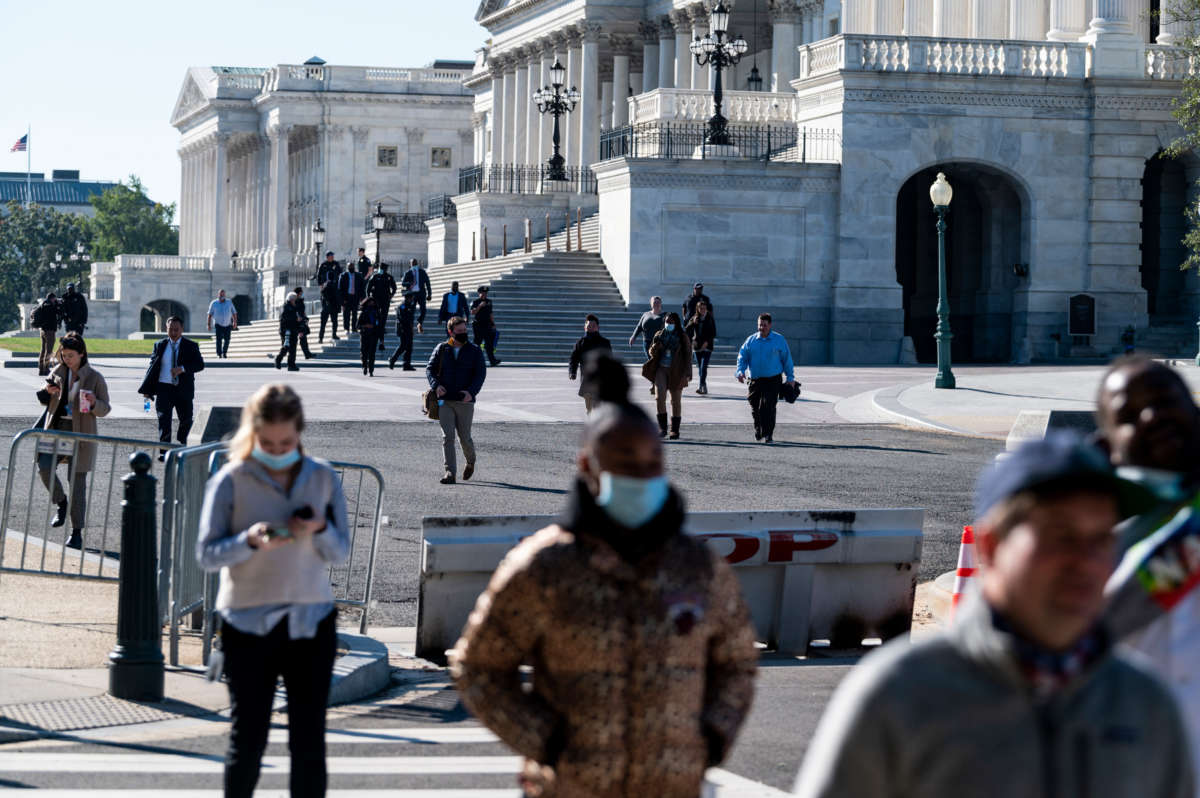Did you know that Truthout is a nonprofit and independently funded by readers like you? If you value what we do, please support our work with a donation.
On Wednesday, Rep. Andy Levin (D-Michigan) filed a resolution that would give the green light to congressional workers seeking to form a union.
The legislation implements existing policies that allow unionization among congressional staffers but that aren’t activated until they’re approved by Congress. If the resolution passes, House staffers will be able to begin petitioning for and forming unions.
“In recent weeks, congressional staff have shared bravely their workplace experiences, good and bad, clearly illustrating their need for the protected right to organize,” Levin said on Wednesday. “Today is about a simple proposition – that congressional staff must enjoy the same fundamental rights of freedom of association at work, to organize and bargain collectively for better conditions, that all workers deserve.”
The resolution has 130 cosponsors, including members of the progressive “squad” like Representatives Alexandria Ocasio-Cortez (D-New York), Pramila Jayapal (D-Washington) Cori Bush (D-Missouri) and Jamaal Bowman (D-New York). If it is passed, workers will have to unionize office-by-office.
Congressional workers have been organizing for over a year, according to the Congressional Workers Union. The movement recently gained steam when House Speaker Nancy Pelosi (D-California) spoke out in favor of the organizing workers. Press Secretary Jen Psaki has also said that President Joe Biden supports the union push.
The Congressional Workers Union celebrated Levin’s resolution, adding that it’s time for members of Congress to live up to their professed ideals when it comes to unions and organizing.
“While we welcome the outpouring of support from lawmakers in the days since our organizing launch, we as staff remain exposed to retaliation for our organizing efforts and will remain exposed until the House passes the Resolution,” the workers said in a statement. According to Insider, the organizing workers are all Democrats.
“We urge House leadership, who has voiced support for the union effort, to bring it to the floor for a vote at the earliest opportunity,” they continued. “Now is the time to demonstrate your commitment to all workers – including your own – through action. The world is watching.”
Congressional workers face low wages and poor working conditions that have led to a “brain drain” in Congress, the organizing workers noted. Talented staffers will often go to lobbying firms or take private sector jobs with better pay. As long as staffers’ working conditions remain the same and they are denied a voice in the workplace, the organizers said, they will be unable to serve lawmakers’ constituents to the best of their abilities.
The workers’ effort has garnered support from influential labor leaders like President of the Association of Flight Attendants-CWA Sara Nelson and American Federation of Labor and Congress of Industrial Organizations (AFL-CIO) President Elizabeth H. Shuler, among others.
Pelosi has yet to say when she will bring the legislation to a vote. During a press conference on Wednesday, she said that House Administration Committee Chair Rep. Zoe Lofgren (D-California) should review the legislation. Lofgren has previously voiced support for the union push.
Senate staffers will face a tougher road to unionization, however. In order for Senate workers to unionize, the chamber will have to pass its own resolution allowing offices to form a union.
Senate Majority Leader Chuck Schumer (D-New York) is supportive of the union effort. But the resolution would likely have to pass the 60-vote filibuster threshold to be approved, and Republicans, along with conservative Democrat Joe Manchin (West Virginia), have already thrown cold water on the union push.
A terrifying moment. We appeal for your support.
In the last weeks, we have witnessed an authoritarian assault on communities in Minnesota and across the nation.
The need for truthful, grassroots reporting is urgent at this cataclysmic historical moment. Yet, Trump-aligned billionaires and other allies have taken over many legacy media outlets — the culmination of a decades-long campaign to place control of the narrative into the hands of the political right.
We refuse to let Trump’s blatant propaganda machine go unchecked. Untethered to corporate ownership or advertisers, Truthout remains fearless in our reporting and our determination to use journalism as a tool for justice.
But we need your help just to fund our basic expenses. Over 80 percent of Truthout’s funding comes from small individual donations from our community of readers, and over a third of our total budget is supported by recurring monthly donors.
Truthout has launched a fundraiser to add 379 new monthly donors in the next 6 days. Whether you can make a small monthly donation or a larger one-time gift, Truthout only works with your support.
